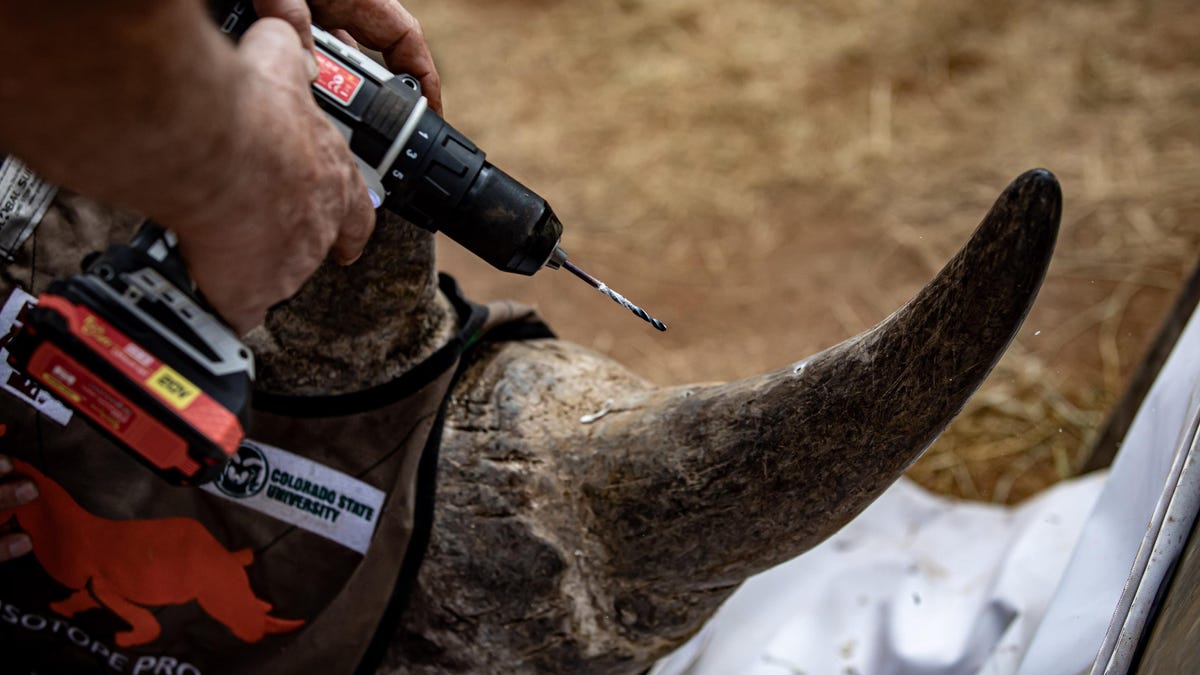Scientists in South Africa injected live rhino horns with non-toxic radioactive isotopes. This approach is led by the University of the Witwatersrand in Johannesburg to change wildlife conservation by making rhino horns both detectable at borders and unfit for human consumption.

Also Read: China’s Chang’e 6 Lunar Probe Returns with Samples from the Moon’s Far Side
Launched by the University’s Radiation and Health Physics Unit, the Rhisotope Project is designed to be a countermeasure against the illegal harvesting of rhino horns, which are sought after for traditional medicine and luxury items.
The project has been in development for several years. By making the horns radioactive, the project aims to deter smuggling and save countless rhinos from poachers.
The project involves drilling small holes into the horns of 20 sedated rhinos and inserting low doses of radioisotopes.
Over the next six months, these rhinos will be closely monitored to assess their health and the effectiveness of the radioactive isotopes.
Expert veterinarians oversee each insertion to ensure the safety and well-being of the animals with extreme care taken to prevent any harm.
Extensive research and testing have been conducted to ensure that the radioisotopes used pose no health risks to the rhinos or their caretakers.
The radioisotopes used are non-toxic and designed to last up to five years, making them a cost-effective solution compared to dehorning, which needs to be repeated every 18 months.
The radioactive material can be easily detected by radiation sensors at international borders originally intended for preventing nuclear threats.
This detection capability will enable quick police action against smuggling attempts, thus curbing illegal trade.
The radioactive nature of the horns makes them essentially poisonous for human consumption, deterring their use in traditional medicine and luxury items.
This dual approach rendering the horns unfit for consumption and making them detectable at borders aims to reduce the demand for poached horns.
If successful, the project could extend to protecting other endangered species such as elephants and pangolins. There are also considerations to apply this technique to various plant species that are threatened by illegal harvesting.
Also Read: Chimpanzees Use Medicinal Plants to Treat Illness and Injuries
Despite a reported 11% decrease in rhino poaching in South Africa in 2023, with 499 rhinos killed, the threat remains significant.
South Africa is home to approximately 80% of the world’s white rhinos and around 30% of black rhinos. The demand for rhino horns in some Asian countries is driven by beliefs in their medicinal properties.
At the Limpopo Rhino Orphanage in the Waterberg area, scientists injected radioisotopes into the horns of 20 rhinos.
The project is led by James Larkin from the University of the Witwatersrand’s Radiation and Health Physics Unit.
The process involves sedating the rhinos, drilling small holes into their horns and inserting tiny radioactive chips. The rhinos did not experience pain during the procedure.
The radioactive dose is minimal and designed not to impact the rhinos’ health or the environment. It is strong enough to trigger radiation detectors at international borders originally installed to prevent nuclear terrorism.
The horn is also with thousands of microdots containing identification information, which aids in tracking and verification.
Rhino horns have a black-market value comparable to gold and cocaine. Previous methods like dehorning and poisoning have failed to sufficiently deter poachers.
The radioactive makes the horns easily detectable and less valuable as they become hazardous and unsuitable for consumption. This is expected to decrease the incentive for poaching.
Border agents around the world are equipped with radiation detectors that can identify contraband. The insertion of radioactive material will ensure that trafficked rhino horns are quickly flagged and confiscated at ports and airports.
The radioisotope remains effective for up to five years, providing a long-term solution that is more cost-effective than repeated dehorning which typically needs to be done every 18 months.
Indonesian authorities recently arrested six suspects involved in a poaching network accused of killing over two dozen critically endangered Javan rhinos.
A Malaysian man known as the “Godfather” was sentenced to a year and a half in a US prison for trafficking black and white rhino horns.
Also Read: Harvard Scientists Say Aliens May be Living Among us in Disguise





